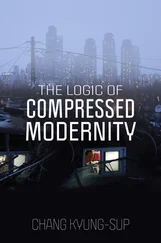Mi-Young came up swinging; she madly pounced on June, all fists and fingernails, and for a moment no one did anything, paralyzed by her uncharacteristic, explosive rage. Hector actually confused the two of them, sure that only June could be as furious as that. He was the first to reach them, and as he pried Mi-Young from her he was struck by how June left herself wide open as Mi-Young wildly rained down blows, not even curling up in a ball, not even shielding her face. When Sylvie got there she instinctively fell upon June to cover her and it was only then that June began to cry. It was like any girl’s weeping, the sobs breathy and plangent, but no one had ever seen June cry before and the sight and sound of it was oddly awesome, everyone (including Mi-Young) standing by silently. Then Sylvie spoke, murmuring to her that she would be all right. But June didn’t look all right; there were ugly scratches on her cheeks and nose and her lip was bleeding and one eye was already turning purplish and inky with a bruise. It was wholly her own fault, yet she was the injured one, and Sylvie helped her up and the two of them walked back to the Tanners’ cottage, June’s bloodied face staining the fabric of Sylvie’s blouse.
After that, June didn’t play in any of the games. Whenever Hector saw her outside in the yard or at the dining tables under the pavilion she appeared to keep herself at a distance from Sylvie and the other children. She continued working in the Tanners’ cottage, and for longer stretches than before; from his chair outside his quarters Hector would catch sight of her coming and going whenever Reverend Tanner traveled. It was as if they had entered into some kind of agreement, one in which June would respect the right of the others to be with Sylvie in exchange for more hours together. He couldn’t help wondering, as surely everyone was, what they did in private, picturing how they were knitting (Sylvie was having the older girls make all the children mittens for the approaching winter), or reading books, or simply sitting together talking (though about what? the wondrous future? the awful past?). He thought he knew what any orphan would desperately seek in a woman like Sylvie, but what Sylvie was doing, what she was actually intending, he couldn’t fathom. Reverend Tanner had made announcements about adoptions, that they might be chosen in the next period and should be prepared, but he would always note that he and his wife would be continuing their work only here, knowing every last one of the children was surely wishing it would be he or she the Tanners themselves might eventually take to America.
It was strange, but sometimes he felt he might like to be adopted away, too. Welcomed back but by an unfamiliar set of people and in a circumstance in which he would have no responsibilities except for some strenuous job or chores. His mother was gone now, too, from a massive stroke during the last month of the war, and though he still had his sisters, he didn’t want to return to Ilion or any place like it and he even surprised himself with the ridiculous fantasy of being the Tanners’ handyman, lodged in a shack he imagined would be damp and cool for being set on a property on a bay of Seattle, waiting for Sylvie Tanner to come bring him a slice of cake, a mug of tea.
The kitchen aunties had opinions about everything and held forth in their hardscrabble voices, and while cleaning out the garbage cans he heard their baseless conjectures about why the Tanners were childless (“She’s too thin to become pregnant”; “She must not want his children”; “They lost the one they had”), and why she gave special attention to June (“She needs the most mothering”; “The girl reminds her of herself”), but none of these remarks quite described the cloister Sylvie was willing to make for them, despite Reverend Tanner’s obvious displeasure and the growing puzzlement of the other children. Did the marks on her heels explain it any better? Was any addiction or compulsion (like his own jags of drinking and fighting) really worth looking into, for explanation or cause? Those pin-dots-and all his own perfectly healed scars-went forward and back, and they were now their own reason and consequence.
As the weather cooled with the onset of autumn, the schedule of Sylvie’s day began to change; she would teach the English class and take the midday meal with the children, but instead of communing with them in work or play the rest of the afternoon she began to retire to the cottage, at first excusing herself in the late afternoon but then going off sooner and sooner until finally she would slip off right after lunch, sometimes for the rest of the day. Whenever she went inside, June would go with her and leave only just before eight o’clock, when Hector shut down the compound’s generator and the entire orphanage went dark. There was talk that Mrs. Tanner was ill-even her usual paleness seemed diluted, as if water had been added to her blood-but she didn’t complain of anything or travel to any hospital, and no doctors visited her. Of course Hector saw her differently, noticing only how she would keep scratching at her arms, her throat, how she would momentarily disappear within herself while the children or aunties were talking to her, coming back only when they raised their voices. He assumed she had a stash of vials hidden somewhere, but what would she do when she ran out? He could get her more, for sure, from the base in town, or some bar in the red-light district. Was that where she really went, when she took her weekly trips into town? Maybe she had already depleted her supply; for a while now everyone else had believed she was suffering from what appeared an intransigent head cold, her eyes rheumy, puffed; she sniffled and blew her nose constantly. She hardly seemed to eat at meals, always just sipping from the roasted barley tea the aunties made for her daily. She didn’t look thinner so much as hollowed out, in certain bright morning light her skin seeming practically diaphanous, the veins of her throat run through with such a deep, dyed blue that Hector kept ready to press his hand against her neck, to warm her in case she fainted. She was paying no more or less attention to him, paying him the usual small kindnesses of a sandwich or a roll of Spam kimbap delivered by June to where he was working, or leaving a pint of bourbon or scotch by his door if she’d been into Seoul for supplies. The regular attention led him to believe she was thinking of him daily but it was still only June who came around, Sylvie no longer stopping by even to watch him work the trench or the roofs. Soon he was alternating between irritation for this surely pitiable person and a feeling as if he were completely parched inside, crackled with a web of fault lines that ran from his insides outward and showed to everyone who looked at him. He felt somehow wounded and ashamed.
One morning, before first light, he set himself to the trench work, carving out a few meters of earth, thigh deep and twice as wide as he. He welcomed the toil; the only time he felt remotely righteous was as an instrument. In the afternoon he ascended yet another badly leaking roof and pried up the broken tiles and peeled away the rotted layers beneath, reframing the section with fresh planks and sheathing, sometimes working right through dinner. By the end of the day he could hardly lift his arms to strip himself bare behind his living quarters, where he washed his mucked clothes beneath the shower he had rigged. He knelt and scrubbed them with the harsh oil soap, kneading each against a piece of flat stone like the aunties did. After draping them on the bushes he turned to himself and worked the large soap block severely against his arms and flanks in order to get up any suds in the hard well water. Early one evening Sylvie came around the back corner and before he could say anything or cover himself she simply left the supper tray on the ground and was gone. The next day he didn’t see her at all but on the following one she appeared with June at her side where he was digging and offered him a drink of cool plum tea, the two of them departing immediately after he handed over the empty glass, only June looking back at him, twice, three times, as if making certain he would keep his distance.
Читать дальше











